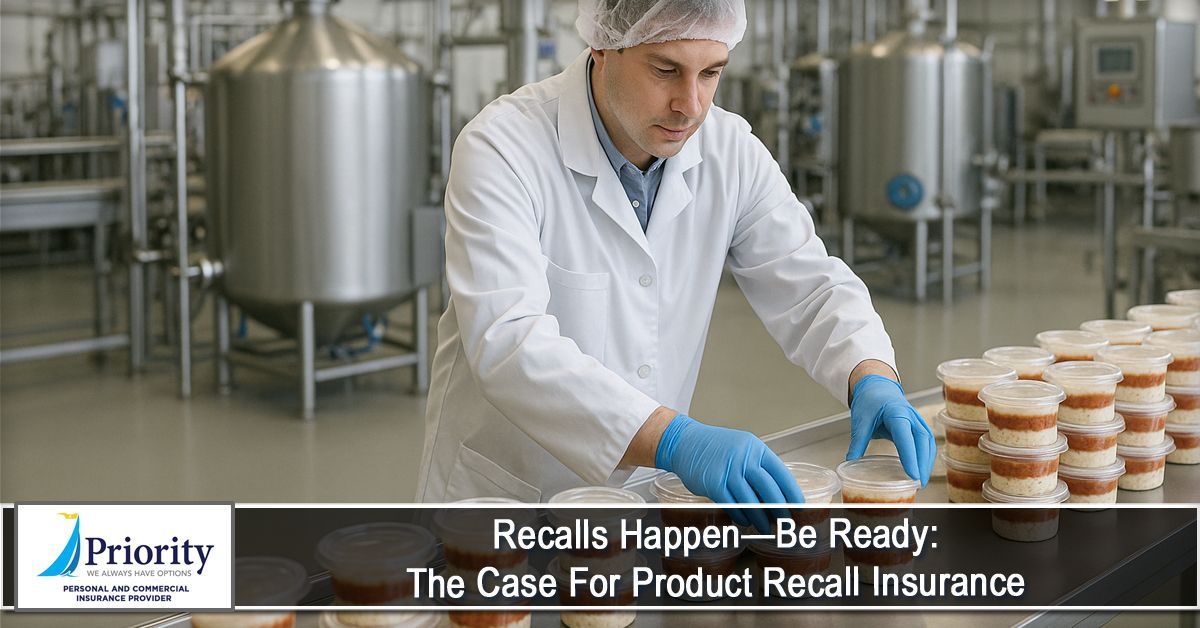
No business wants to face a product recall—but in today’s fast-moving marketplace, even the most reputable manufacturers and distributors can find themselves in the crosshairs. Whether due to a design flaw, contamination, labeling error, or safety hazard, recalls can strike suddenly and carry enormous financial and reputational costs.
That’s where Product Recall Insurance comes in. It's not just for food producers or big-name car manufacturers—any company that produces, supplies, or distributes physical goods should understand the risks and consider this specialized coverage.
What Is Product Recall Insurance?
Product Recall Insurance is a commercial policy that helps companies manage the costs and fallout associated with recalling a defective or dangerous product from the market.
It typically covers:
- Notification costs (to distributors, retailers, or consumers)
- Shipping and disposal of defective products
- Loss of business income
- Public relations and brand rehabilitation
- Legal defense costs in recall-related lawsuits
- Replacement or repair of faulty products
Why Product Recalls Are More Common Than You Think
Product recalls occur across industries, including:
- Food & beverage (contamination, undeclared allergens)
- Automotive (brake or airbag failures)
- Consumer electronics (fire hazards, software glitches)
- Children’s products (choking hazards, toxic materials)
- Pharmaceuticals & cosmetics (incorrect labeling, adverse reactions)
According to the U.S. Consumer Product Safety Commission (CPSC), thousands of recalls happen every year—and they’re not limited to large corporations.
The Hidden Costs of a Recall
Even a small-scale recall can cost a company millions of dollars when you factor in:
- Direct recall expenses (product removal, refunds, restocking)
- Lost sales and market share
- Legal liabilities and regulatory fines
- Damaged brand reputation
- Customer trust and loyalty erosion
Without the right insurance, your business could be left footing the entire bill.
What Does Product Recall Insurance Typically Cover?
While policies vary, most include the following:
1. First-Party Expenses
- Notification and communication costs
- Transportation, storage, and destruction of recalled goods
- Business interruption/lost revenue
- Replacement costs for defective products
2. Third-Party Liability
- Costs related to harm caused by the defective product
- Legal defense for bodily injury or property damage claims
- Damages awarded to affected parties
3. Crisis Management Services
- Access to PR consultants and legal counsel
- Guidance on regulatory compliance
- Brand rehabilitation efforts
Who Should Consider Product Recall Insurance?
You should strongly consider this coverage if your business:
- Manufactures or imports products
- Labels, packages, or distributes consumer goods
- Sources parts or ingredients from third-party suppliers
- Relies heavily on brand trust and customer satisfaction
- Operates in a highly regulated industry
How to Strengthen Your Recall Readiness
- Implement quality control and supplier audits
- Use clear and accurate labeling
- Maintain detailed distribution records for traceability
- Train staff on recall procedures
- Regularly review insurance policies for gaps
Final Thoughts
A product recall can happen to anyone—and when it does, it can quickly become a business-threatening event. Product Recall Insurance acts as a financial safety net, helping you recover quickly, limit brand damage, and preserve customer trust.
Recalls are unpredictable. Recovery doesn’t have to be.
At Priority Insurance LLC, we put our clients first by offering them policies that they can afford. Having insurance is a necessity nowadays, and we're here to help you out. Learn more about our products and services by calling our agency at (864) 297-9744. You can also request a free quote by CLICKING HERE.
Disclaimer: The information presented in this blog is intended for informational purposes only and should not be considered as professional advice. It is crucial to consult with a qualified insurance agent or professional for personalized advice tailored to your specific circumstances. They can provide expert guidance and help you make informed decisions regarding your insurance needs.











